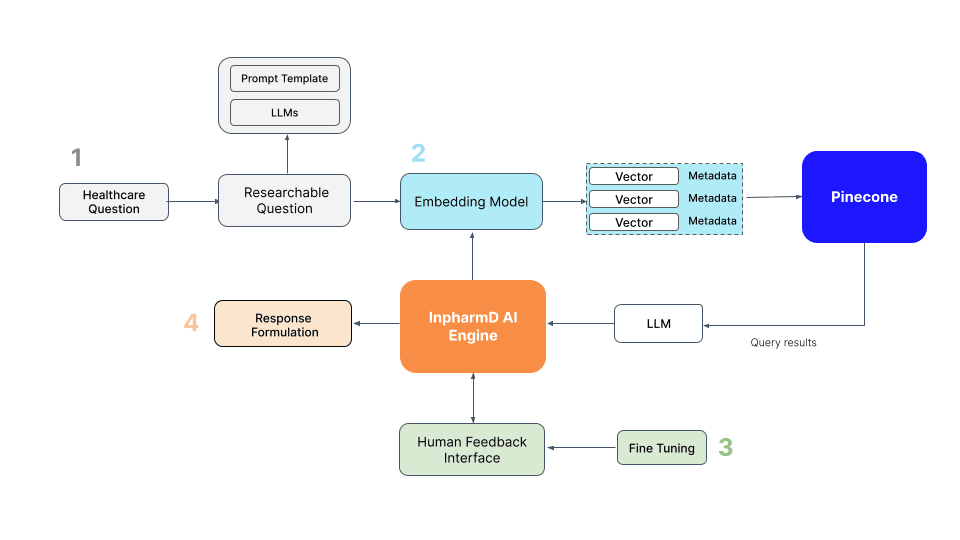
80% Savings
80% Savings
With Pinecone
4X Faster
4X Faster
Query Response Times
95X Faster
95X Faster
First Response Time (FRT)
70% Better
70% Better
Query Accuracy
InpharmD is a digital health platform offering tailored, personalized responses to clinical questions, thereby driving evidence-based patient-care. InpharmD harnesses the power of artificial intelligence and pharmacy intelligence to deliver instantaneous and data-driven drug information to healthcare professionals. InpharmD’s vision is to revolutionize the landscape of information access for clinicians, playing a pivotal role in fostering more informed healthcare decisions.
In 2021, Tulasee Rao Chintha, CTO and Co-founder of InpharmD, made a strategic move, deciding to leverage vector databases for building AI applications and giving InpharmD a competitive edge in the field. This pivotal decision not only shaped InpharmD’s growth, but marked a significant achievement in the realm of digital healthcare.
Navigating the Complex Landscape of Medical Data
Accurate and timely clinical information serves as a cornerstone for ensuring patient safety, optimizing treatment efficacy, and fostering regulatory compliance in the healthcare setting. However, accessing the literature can be time-consuming and imprecise, simply due to the sheer volume of information, unreliable resources, and the need for real-time updates. This becomes particularly challenging given the current time constraints associated with conducting data searches.
InpharmD has developed its own AI Assistant, Sherlock –– a digital platform that uses AI, human expertise, and advanced language models to provide precise and valuable drug information to healthcare professionals. Sherlock utilizes a knowledge base encompassing 30 million documents, enabling healthcare users to access on-demand drug information. Recognizing the need for accurate and timely medical information, InpharmD needed a vector database to address the challenges posed by the intricate nature of healthcare data to provide fast and accurate responses to complex medical inquiries at scale.
Enabling Healthcare Professionals with Sherlock powered by Pinecone
InpharmD required a solution that was production-ready, capable of processing data rapidly, and could comprehend the meaning and context of medical information with minimal latency. After evaluating various vector databases, InpharmD chose Pinecone as its vector database partner to enable the most accurate and efficient retrieval augmented generation (RAG) for Sherlock.
"In 2021, the landscape was different. We envisioned a platform that could not only understand the nuances of clinical inquiries but also respond with tailored, evidence-based information. Pinecone was a game-changer for us as It allowed us to process vast amounts of medical literature with unprecedented speed and accuracy" - Tulasee Rao Chintha, CTO, and Co-founder of InpharmD
Pinecone serves as the core database infrastructure for Sherlock, playing a crucial role in storing and processing vector embeddings for the efficient retrieval of relevant medical information during clinical inquiries. Using Pinecone open-source RAG framework, Canopy, the team transformed its 30 million medical literature documents, originally in PDF form, by extracting text, breaking them down into manageable chunks, and embedding them into 1536-dimensional vectors. These vector embeddings along with key metadata are stored in Pinecone, acting as the long-term memory for AI. This process allows InpharmD to capture intricate semantic relationships and nuances within the medical data in order to effectively answer clinical questions.
With the vector embeddings stored in Pinecone, the InpharmD Sherlock works as follows:
- Query: Healthcare professionals submit questions to Sherlock, and Large Language Models (LLM) determine the necessary data for a comprehensive response.
- Processing: Sherlock processes natural language search terms, translates them into vector embeddings, and performs a similarity search in Pinecone. Canopy, a RAG framework, finds vectors closely resembling the user's question, supplying LLM with more relevant and contextually precise answers.
- Resolution Process: Sherlock refines responses through a fine-tuning phase involving human feedback, pre-trained data, and reinforcement learning, highlighting the intricate nature of InpharmD's inquiry process.
- User Presentation: Sherlock generates a comprehensive response, and then the InpharmD pharmacy team reviews and refines this response before delivering it to clinicians.

By incorporating Pinecone into this process, InpharmD streamlines vector searches, empowering Sherlock to furnish the in-house pharmacy team with accurate and relevant responses to medical queries.
"Pinecone is integral to our data-driven operations. Its seamless scalability, rapid query results, and impressive low latency make it an indispensable asset in enhancing efficiency and productivity” - Tulasee Rao Chintha, CTO, and Co-founder of InpharmD
Delivering a 70% Increase in Accuracy for Evidence-Based Care with Pinecone
InpharmD is making significant strides in delivering evidence-based care that is not only more accurate and efficient, but also cost-effective. With Pinecone, InpharmD has experienced:
- Cost Efficiency: InpharmD has realized exceptional cost savings of data storage, amounting to approximately 80% savings since using Pinecone. This represents a significant reduction in the resources required for information retrieval, underlining the platform's commitment to cost-effective healthcare solutions.
- Time Efficiency: The response time to user inquiries has seen a remarkable 75% reduction, with the first response time now 95 times faster. This means healthcare professionals receive the information they need more promptly, fostering quicker decision-making in clinical settings.
- Enhanced Accuracy: The adoption of Pinecone has led to a significant 70% improvement in result accuracy, providing more precise and contextually relevant answers. InpharmD now has the confidence that it provides accurate information to healthcare professionals, contributing to better-informed decision-making and positively impacting patient care
- Scaling Effectively: Pinecone indexing and search for over 2 billion vectors simultaneously provides InpharmD with the necessary long-term memory to continue expanding and incorporating additional medical literature into their dataset. The team plans to further scale their vectors to ~40 billion, ensuring that healthcare professionals consistently receive prompt and accurate responses to their inquiries.
"In healthcare, time is often a critical factor. By leveraging Pinecone's capabilities, we've not only accelerated the information retrieval process but also reduced the time clinicians spend on navigating complex literature. This not only translates to time savings but also contributes to more efficient patient care” - Tulasee Rao Chintha, CTO, and Co-founder of InpharmD
As InpharmD continues its journey at the forefront of AI-driven healthcare solutions, Tulasee Rao Chintha reflects on the transformative power of technology. "Our vision is to empower clinicians with unparalleled access to actionable drug information. Pinecone has been instrumental in realizing this vision, and we're committed to pushing the boundaries of what technology can achieve in healthcare."

